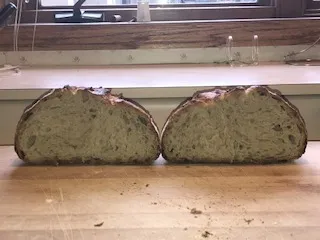
Hello all,
It's Monday AM and I am going to bake my third loaf of Forkish's Overnight White. My two attempts last week were not ideal. I went by the book except that I used 20% whole wheat flour. In my two bakes last week the dough had seriously over fermented overnight at 80 degrees. He suggests 12-14 and my first loaf went for 15 hours,my second loaf for 13 hours. After the bulk ferment they both ended up in a similar state. They had expanded to probably 4 times their original volume and became very gasey,billowy,pillowy. I put the dough onto my surface and stretched it out and small amount and patted it down with medium pressure. I didn't want to completely de-gas it. I followed directions for shaping and proofing and baked as he directs,seam side up. The loaves had great oven spring but the tops totally blown out. In my previous bakes with Lahey's No Knead and Hamelmans Rustic Bread there were one or two well defined expansion (seam) cracks. On these loaves half of the tops were all blown out with no definition. I baked fairly deep and the crumb was not super open but the taste and texture were fairly good. On the second loaf of last week the crust softened to a large degree after being out of the oven for several hours. In the spirit of changing one variable at a time in order to achieve a difference in your loaf I lowered the water temp from his recommended 95 degrees to 80 degrees. I thought for sure this would have some effect on this over fermenting however it did not. It still gained 3-3.5 times volume overnight (12 hours).
My questions are as follows:
1) Why is this dough continuing to over ferment? It only has 1/8 tsp for 500 grams four. Do I need to put it in my kitchen which is 70 degrees instead of my laundry room which is 80 degrees? I thought 80 was sort of an ideal bulk fermenting temperature. He doesn't indicate a bulk fermenting temp. Do I need to lower length of bulk fermenting time? Do I need to lower water temp again? A combination of all of these elements.
2) What is the best way to handle a straight dough which has over fermented. Should you moderately de gas or do more than that? Should the fact that it over fermented affect how long/to what degree I let it final proof? I am determined to get this recipe to work. I have had good luck with the above mentioned breads and would like to get this one to work. I feel that by trouble shooting/changing variable and getting it to work will be lessons that will improve my baking skills.
3) I the top blowing out because the dough was over bulk fermented? I watched the final proof closely and feel like I had done that correctly. Are the seams not holding because it was over fermented or have I used too much flour on the cutting board surface?
4) Why did the crust soften on my second loaf?
I am including several photos. The baked loaf shots are from my second loaf. The fermenting dough pictured is from this morning and is in a 3 quart bowl and was probably actually a bit higher before I took the saran wrap off. It deflated slightly after taking the wrap off. The shot of the banneton is the dough just after shaping. 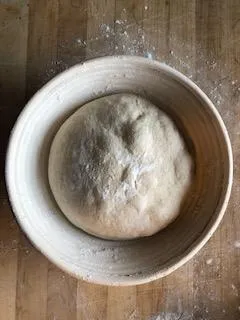
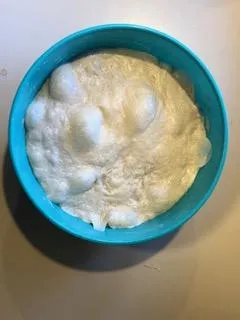
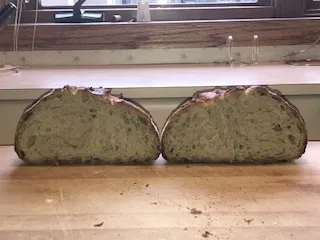
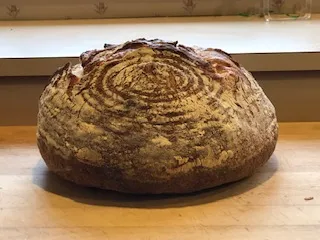
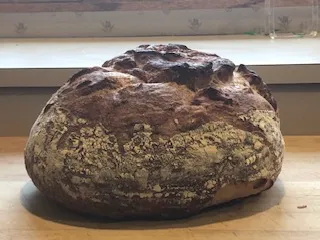
Happy MLK day!!!!!!,
Vance
1. You should be fermenting at 70 degrees. That’s what Forkish’s kitchen is.
2. Take it out, reshape and let rise 50 or so % before baking.
3. Don’t know
4. Don’t know.
Thanks Danni! Not sure where I came up with this 80 degree ideal temp from. I'll retry later in the week.
Best,
Vance
...80 degrees, wouldn't it be also possible to drastically shorten the time, say from 12 hours down to 4 or something?
David,
Yes that is one variable I could change and avoid over fermenting. From what I've read however I will get a more flavorful dough if I develop it for a longer period of time. As Danni suggests,what I need to do is lower the temp by ten degrees to 70 and I should be able to maintain that longer,12-14 hours of bulk fermentation that Forkish recommends. Thanks for your comment!
Regards,
Vance
You can throw it out. I am not familiar with the recipe, but a dough left out at room temp for 12+ hours will almost certainly be over fermented, even with the portions of yeast to flour you mention. If you want to develop flavor through long fermentation,refrigerate/retard your dough overnight. It will slow down the yeast, you slow its rate of sugar consumption, hence its rate of fermentation. Try leaving your mixed dough out for 1 1/2 hrs, then degassing, followed by covering with plastic and refrigerating. Next day shape & proof. Even better, allow to ferment at room temp for 1 1/2 hrs, degass, rest, shape, and proof for 45 minutes before retarding. It can be baked right out of refrigerator next day.
Thanks Wally! I'll try your technique with my next loaves.
Regards,
Vance